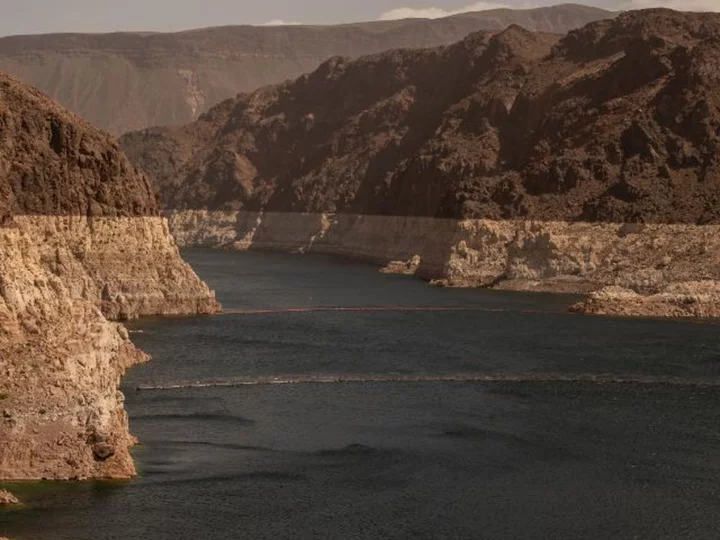Three Southwest states announced Monday they have struck a historic deal to cut millions of gallons of Colorado River water usage over the next four years, about half of which would be completed by next year, in an effort to stave off a crisis at the nation's largest reservoirs.
The deal between California, Arizona and Nevada agrees to cut at least 3 million acre-feet of water through 2026 -- around 10% of the states' Colorado River allocation -- water that would otherwise be used to irrigate farms, generate hydropower or feed municipal drinking water systems.
About 1.5 million acre-feet of that water is set to be cut by the end of 2024. Most of the cuts would be compensated with at least $1 billion in federal funds from the Inflation Reduction Act.
The plan still must be finalized after a federal environmental review, which the Department of Interior said on Monday it would begin. The four states that make up the river's Upper Basin -- Colorado, Wyoming, Utah and New Mexico -- said they supported reviewing the new plan.
The deal marks a major step after months of tense negotiations to save a crashing Colorado River system, which provides water to more than 40 million people in the West. That system has shown alarming water loss in recent years after a multiyear, climate change-fueled drought collided with decades of overuse.
Western and federal officials have scrambled to reach an agreement to boost water levels at the nation's largest reservoirs, Lakes Mead and Powell, and prevent them from plummeting to so-called dead pools, at which point water would no longer flow through their dams.
The deal would also allow for the federal government to step in and make additional cuts should Mead and Powell levels drop further. Those cuts would be triggered if Mead fell to 1,000 feet and Powell fell to 3,500 feet -- just over each reservoir's dead-pool level.
The federal government signaled support for the lower basin deal on Monday by agreeing to withdraw a dramatic environmental analysis it outlined last month that would have forced the three states to cut nearly 2.1 million additional acre-feet of their Colorado River usage in 2024 alone. At the time of its release, top federal officials said publicly they hoped their proposal would spur discussion among states who have spent the past year sparring over cuts.
Interior Sec. Deb Haaland said in a statement that the deal was a "testament" to the Biden administration's "commitment to working with states, Tribes and communities throughout the West to find consensus solutions in the face of climate change and sustained drought."
In a letter to federal officials announcing the plan, the governors of California, Arizona and Nevada wrote they were "pleased and encouraged by this successful collaboration" among the three states.
In a separate letter from all seven basin states to the federal government, the state requested federal officials grant an extension to its period for states and other stakeholders to comment on its analysis, which ends on May 30 -- allowing for all states to negotiate on the latest deal.
"Nothing in this letter should be construed as an Upper Basin endorsement of the Lower Basin Plan," the seven-state letter reads, adding that all seven states support the proposal being submitted to the federal government and want more time to strike a final deal.
Water officials from California -- a state that in January found itself isolated from the other six states -- wrote on Monday they were pleased with the outcome of the lower basin states going back to the table.
"California and our partners in Arizona and Nevada have developed a plan to better perform and protect the Colorado River system than either action alternative identified in the current [federal proposal] released last month by Reclamation," California's lead Colorado River negotiator JB Hamby said in a statement.

